Date set for NI elections
Elections will take place in Northern Ireland on March 7th next year, in preparation for a restoration of devolved powers three weeks later.
A new bill published today outlines how a transitional assembly will come into effect next Friday and sit until January 30th, at which point it will be dissolved.
Elections will be held in Northern Ireland for an assembly that will take devolved powers from March 26th – the first time local politicians will have controlled their own affairs since the assembly was suspended amid allegations of a spy ring in October 2002.
Today’s Northern Ireland (St Andrews agreement) bill, which is based on the deal put forward by the British and Irish governments in the Scottish town of St Andrews last month, also includes plans for a new oath of office.


This will be controversial among both Sinn Fein and the Democratic Unionist Party (DUP), as it demands both full cooperation with the Irish government in Dublin – an issue for unionists – and full cooperation in policing – a concern for republicans.
The pledge of office must be taken by all ministers in the Northern Ireland executive and requires them to participate in the British-Irish Council among others, and to endorse “fully” the police service of Northern Ireland (PSNI) and the criminal justice system.
“The twin pillars of power sharing and support for the rule of law will be set in statute once this legislation passes through parliament,” said Northern Ireland secretary Peter Hain.
“It will create a new era of political stability for the first time in Northern Ireland’s history. Devolution gives local politicians the power to take local decisions about local issues. I hope they will grasp this opportunity.”
Earlier this year, the British and Irish governments set November 24th as the deadline by which a new first minister and deputy first minister must be chosen and a new executive set up in Northern Ireland.
If that did not happen, Tony Blair and taoiseach Bertie Ahern said the assembly at Stormont would be dissolved and members – who have been paid despite not sitting since 2002 – would lose their pay and allowances.
However, when agreement seemed unlikely the two leaders put another timetable to the Northern Ireland politicians in the form of the St Andrews agreement, which envisages a restoration of power by March if everyone agreed.
Today’s legislation makes clear that assembly members will continue to be paid until January 30th next year but holds out hope that an agreement can be reached by then, particularly between the two biggest parties, the DUP and Sinn Fein.









